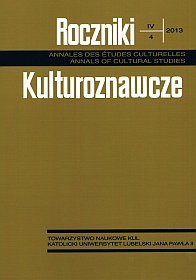Cultural Policy of Lublin in the Light of Efforts for the Title of European Capital of Culture 2016
Abstract
The purpose of this article is to present the role and importance of culture of Lublin over several years of effort for the title of European Capital of Culture 2016. In addition, to show the main objectives of the cultural policy of the city. Despite the defeat, Lublin presented the range of cultural values of Eastern Poland. Visually showed the involvement of the city and its citizens in the creation of a new quality in the field of culture. These features have been highlighted in Lublin, which set it apart from most developing economically western cities. University character, openness to other cultures, dialogue, exchange, aspirations—all decide about European dimension of Lublin. The city that managed all the material resources of the cultural space in organizing a number of events, does not give up despite defeat efforts of the above-mentioned title. Year 2017—seven hundredth anniversary of granting civic rights is the year in which all the assumptions of the contest Final Application ECOC 2016 should fulfil. Culture is considered to be the backbone of the development of modern cities. Today, the development provides primarily social capital, that is, the quality of “what is between us.” An important factor in the formation of cultural identity is the attitude of the citizens of the city of Lublin. Students, artists, an increasing number of tourists. Their lives, passions, have an impact on the shape of this place. Lublin is one of the places, that is said to have soul and spirit—genius loci. Old buildings, forgotten alleys—all this affects the quality of perception of the city. A number of cultural events, including held for three years, juggling performance “Karnawał Sztuk-Mistrzów” (“Carnaval of Magicians”—in Polish “Sztuk-Mistrzów” is word game: “of Masters of Arts”), annually attracts thousands of spectators from across the country and artists from abroad. Genius loci old rule still applies. The city must have “something.” It must be original and have the characteristics of authenticity. The article uses analytical and descriptive method.
References
Bagby P.: Pojęcie kultury. Warszawa: Wydawnictwa UW 1998.
Baldwin E.: Wstęp do kulturoznawstwa. Poznań: PWN 2007.
Bieniecki M.: Lublin – miasto które prowadzi spójną politykę integracyjną. http://www.biuletynmigracyjny.uw.edu.pl/33-january-2012/lublin-miasto-ktore-prowadzi-spojna-polityke-integracyjna. [20.08.2012].
Bronkiewicz J.: Polityka kulturalna miast rozwija gospodarkę. http://samorzad.infor.pl/temat_dnia/artykuly/387769,polityka_kulturalna_miast_rozwija_gospodarke.html [20.08.2012].
Czarnowski S.: Kultura. Warszawa: Wydawnictwa UW 1998.
Europejski wymiar Lublina jako kandydata do tytułu Europejskiej Stolicy Kultury 2016, http://kultura.lublin.eu/pi/11714_1.pdf [11.01.2012].
Florida R.: Narodziny klasy kreatywnej. Warszawa: Narodowe Centrum Kultury 2010.
Gierat-Bieroń B.: Kultura w mieście. http://www.instytutobywatelski.pl/4321/lupa-instytutu/kultura-w-miescie [13.08.2012].
Grad J., Kaczmarek U.: Organizacja i upowszechnianie kultury w Polsce. Zmiany modelu. Poznań: WN UAM 2005.
Kłoskowska A.: Socjologia kultury. Warszawa: PWN 1983.
Konkluzja Rady z 24 maja 2007 w sprawie sektora kultury i sektorów kreatywnych w osiąganiu celów lizbońskich, Dz. U. C 311/7, 21.12.2007. Por.: http://eur-lex.europa.eu/LexUriServ [19.11.2011].
LUBLIN Europejska Stolica Kultury 2016. http://kultura.lublin.eu/pi/17772_1.pdf [20.08.2012].
Lublin 2016 Europejska Stolica Kultury 2016 Kandydat. http://www.lublin.eu/images/media/1253265707_ESK_2016.pdf [12.01.2012].
Lublin najbardziej medialnym kandydatem do ESK 2016. http://www.kurierlubelski.pl/artykul/382758,lublin-najbardziej-medialnym-kandydatem-do-esk-2016,id,t.html [12.01.2012].
Miasto w dialogu – 2017. Propozycja do konsultacji społecznych. http://kultura.lublin.eu/pi/19591_1.pdf [12.05.2012].
PAP. Warszawa. Minister Zdrojewski w Sejmie o polityce kulturalnej państw. http://www.e-teatr.pl/pl/artykuly/86435.html. [31.03.2012].
Powszechna Encyklopedia Filozofii. Kultura. Hasło: Kultura http://www.ptta.pl/pef/pdf/k/kultura.pdf [25.03.2012].
Rozwód K.: Opracowanie założeń projektu Lublin 2016 – Europejska Stolica Kultury. Lublin: Urząd Miasta Lublin 2008.
Selekcja Europejskiej Stolicy Kultur na rok 2016 w Polsce. Warszawa, 20-21 czerwca 2011 r. http://www.mkidn.gov.pl/media/docs/esk2016/Raport-ESK2016_PL.pdf [12.04.2012].
Strategia Rozwoju Kultury Miasta Torunia do roku 2020. http://www.federacja-ngo.pl/konsultacje/pix/users/file/AA_Strategia_Kulturalna/Rozdzia%C5%82_II_Za%C5%82o%C5%BCenia_do_strategii.pdf [20.08.2012].
Throsby D.: Ekonomia i kultura. Warszawa: Narodowe Centrum Kultury 2010.
Tylor E.B.: Cywilizacja pierwotna, badania rozwoju mitologii, filozofii, wiary, mowy, sztuki i zwyczajów. Przeł. Z.A. Kowerska. T. 1. Warszawa: Wydawnictwo „Głosu” 1986.
Wnuk-Lipiński E.: Rozumienie kultury, Szkice socjologiczne. Warszawa: Instytut Wydawniczy CRZZ 1979.
Zainwestuj w Lublinie – naprawdę warto! http://www.lublin.eu/Zainwestuj_w_Lublinie_naprawde_warto_-1-268.html [13.08.2012].





